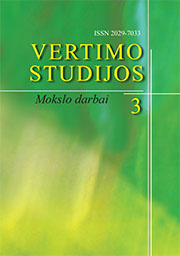LAIKO DEIKSĖ POLITINĖJE RETORIKOJE: PRALEIDIMO IR PRIDĖJIMO STRATEGIJOS
VERČIANT Į ANGLŲ KALBĄ
TIME DEIXIS IN POLITICAL RHETORIC: TRANSLATION STRATEGIES OF OMISSION AND ADDITION
Author(s): Nijolė MaskaliūnienėSubject(s): Lexis, Comparative Linguistics, Theory of Communication, Translation Studies
Published by: Vilniaus Universiteto Leidykla
Keywords: Political rhetoric; Translation; omission; addition;
Summary/Abstract: The article discusses the concept of time deixis as a constituent element of the act of communication that is crucial for the understanding of the speaker’s message by his/her target audience. The role of deixis increases in translation because languages are different in terms of their lexical and grammatical inventories of expressing deictic reference. The meaning of deictics themselves (personal or demonstrative pronouns, time and place adverbs, etc.) has to be inferred from the context of the utterance. This becomes particularly important in politics, because different contexts may allow a certain degree of flexibility in the interpretation of an utterance and can thus become a powerful means of manipulating the listener. The main focus of the article is on the expression of time deixis in political speeches in Lithuanian and its rendition into English. It is found that translators mainly use two strategies in translating utterances with time deictics: omission and addition. The omission of lexical deictics in translation into English is usually compensated for by grammatical tenses. The addition of time deictics is justified by the translator’s efforts to re-create the power of the original (source) speech in translation.
Journal: Vertimo studijos
- Issue Year: 3/2010
- Issue No: 3
- Page Range: 72-83
- Page Count: 12
- Language: Lithuanian

